Give Germany A Break
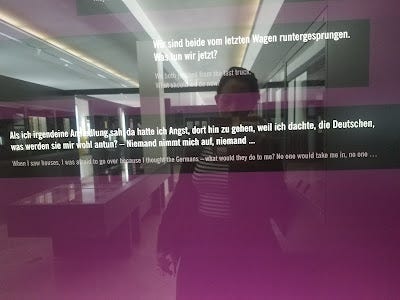
I never shared about three of my favorite travels when in Germany. Not because I didn't wish to, but because I wasn't sure how to. My brain was so full of so many thoughts. I was challenged, inspired, stretched.
I'm still not sure I can do justice to it all. But I shall try.
The first of the three was one weekend when my Au Pair father took me and the baby to Munich.
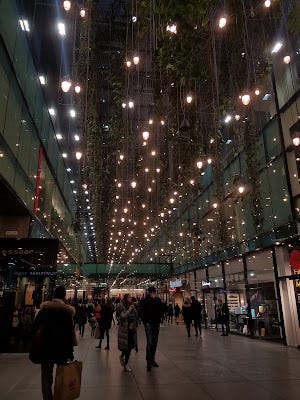
Plants hanging from the ceiling with lights in Munich.
First, we went to the university and saw a memorial for the Weisse Rose (White Rose) a group of non-violent intellectuals and artists who resisted Hitler's Third Reich. I had heard of them before and would love to study more about them, especially some of the women involved: women who gave their lives to show their love for the good and true things. There are those who refrain from admiring good women doing extraordinary things because of feminists saying, "We need more women doing men's jobs."
We do not need more women replacing men, but more women and men to do good things. And when I see such women, I admire them and want to be like them, not to replace men, but to help spread goodness.
Such women I wish to study more about are Sophie Scholl, Maria Leipelt, and Ilse Ledien. Women who risked their lives doing dangerous things, not in anger but in passionate love. Some of these women kept their lives, but some of them were executed.
But even more than these, what really stood out to me was what my Au Pair father said as we were leaving. "What many people forget is that not all Germans supported Hitler from the very beginning."

Laminated letters in the pavement outside Munich University "Not every German was a Nazi."
I knew it. But still, it hit me as a revelation, anew and fresh.
There is always a minority. Nevertheless, the majority believes it is right; that it rules. There is always a minority that knows how to think, not merely what to think. There are always those that love humanity more than their country, and they are willing to be killed by their country and fellowmen in the name of honor and goodness. Such men understand true loyalty. Such men who I wish to be like.
And such men are why we should forget the crimes of the past to see the people of today. But more on that ...

Tunnel in Eagle's Nest bunkerI mentioned to my Au Pair family that I would like to visit Eagle's Nest. And they seemed to think that was a very nice idea, too, and so we made a family trip of it. The main part was closed, but we toured the underground bunker (picture above is from that).
I saw many interesting things. I saw old children books with illustrations of Jewish priests eating children. I saw boy pocket knives with Adolf Hitler on them. I saw a bunker that would have housed my family very well and would have been a much better usage than as a place to make plans for war and death.
But what I found very interesting was how Germans feel obliged to remember and prolong the evils of their past. As if it belongs to every one of them; as if they are all responsible for the actions of their ancestors; as if those few good Germans that stood up did not matter after all.
Because they have all accepted the guilt and shame, and live under its heavyweight.
And in America we forget our own crimes, remembering only the crimes of others. We forget that we imprisoned every American Japanese, but we remember Pearl Harbor. We forget what we did in the Vietnam war, but we remember 9/11. We forget we allied with Stalin, a man who had already murdered multiples of what Hitler had when we said we must stop Hitler at any cost. We forget that we allowed Russia to have a huge piece of Germany at the end of the war, resulting in the catastrophe of the Berlin Wall.
We say our sin is not as great as theirs. We forget what we have done. But we never allow them to forget. And they do not even try.
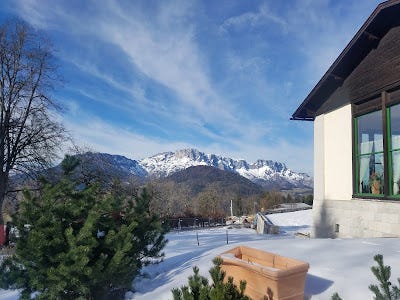
Above: The mountains of Eagle's Nest. Mountains that saw so many good times, but now are only visited because of a small evil event in history.
Below: A church that brings light at the base of the mountains that still cradle the memory of a shame that mankind ought to forget.
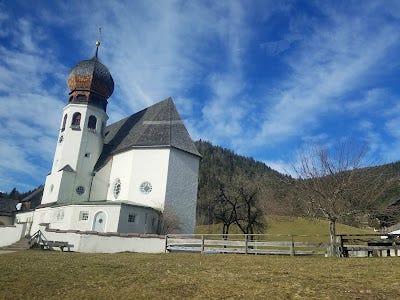
The third place was the Flossenburg concentration camp.
I'm one of those weird girls that didn't plan on visiting any concentration camps or Jewish memorials. To be honest, I've read enough about all of that. I went to Germany for the culture, for the things that one doesn't usually read about, for the people. I wasn't interested in spreading the "remember our shame".
But my Au Pair family said, "We are going to take you to the place where Dietrich Bonhoeffer was killed." And I found myself excited after all.
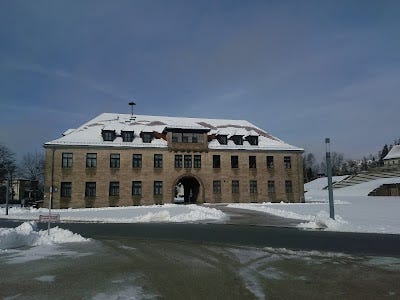
Headquarters

Flossenburg was a work camp that mined for granite. The first inmates were Germans.
The concentration camp was built right beside the town of Flossenburg. The German people knew of its existence; knew that their own countrymen were being locked up. Just as modern Americans, they spoke of patriotism. But who owned their allegiance? The government and the flag, not their neighbors. Even now, when those around us are treated unjustly, do we say or do anything? Or do we, as the village people do, pretend like there isn't a concentration camp next door ... except many of the villagers would pay for the services of a prisoner to work on their farms. Not only would they turn a blind eye on what happened, but they also used it to their own advantage.
But I do not say this to remind you of another's shame. I say this to ask you why we condemn them and yet do not care about the prisoners in our own country? About the injustices happening in our own communities? If they were guilty, we are ten-fold more accountable. For we know history, and yet we repeat it. We chant dates and events, but we do not learn about the ideas. We justify our own actions and say, "But nothing was as bad as what Hitler did."
But is this true?
Do we not also believe propaganda? The victor's story that says, "I am good because I defeated the bad guy?"
Is there ever only one bad guy?
Or are there always, many, many, many people who follow bitterness, frustration, revenge. Are we any different?
Why do we remember WWII? To prolong Germany's sin? Or to make better people of ourselves? And are we truly better?

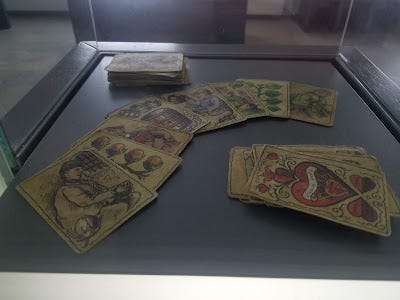
A deck of cards a prisoner made out of scrap materials.

The washroom where prisoners were stripped. "Here we lost our clothes ... and our souls." We speak of how Germans treated their prisoners inhumanly.
Did you know in our own prisons, women and men are stripped and searched no matter what? Over any and every crime.
I have been going to the home church despite lockdown. I stand up for many constitutional rights. I would rather not pay for my car insurance, but be an honest human being who pays her own debts when necessary. Some battles I fight, some I do not. With it all, I risk being imprisoned (some of these I'd have one or two "warnings"). I would be stripped of my dignity. It is designed to be inhumane. But we excuse if saying, "We don't want anyone coming back here."
But I am not going to church because I wish to go to jail or prison. I do not wish to be free so that I might be imprisoned.
Inhumane treatment is not right. And yet we excuse it, justify it, say it's not as bad ...

Information on some of the "special" prisoners. Most of these men did not fear inhumane treatment because they loved humanity so much.

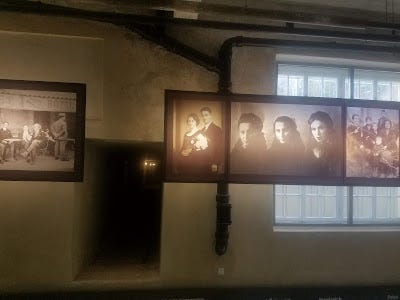
A tunnel with pictures of inmates on each side. Entire families were kept here. Young children, babies, elderly.
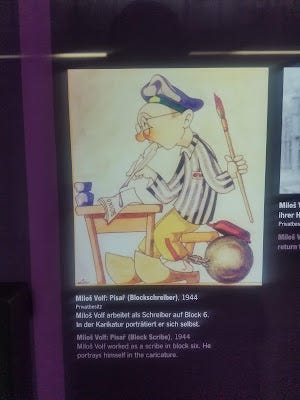
I loved this cartoon. I want to research the artist more. Imagine having the gumption to use your art like this. To show the truth. To tell a story worth telling.
People tell me my politics have swamped out my writing. People have told me they want to see me for who I am, not for what I believe.
I do not wish to make anyone angry, but I do wish that all would be as angry as I, as angry Johanna from the Hunger Games. Angry enough to use our gifts to not please ourselves but help the world.
Maybe "my politics" have taken over. Or maybe I care about people more than my career. Maybe I hate injustice so much I'm really to get stung by hornets.
It gives me a headache. It makes me depressed. I hate it. It's "not good for me". It wasn't good for Jesus to be killed on the cross. I'm sure Dietrich Bonhoeffer and Sophie Scholl didn't enjoy losing their heads. But sometimes we have to sacrifice our comfort and our desire to do the right thing, to say the right things.
Even if it hurts. Even if it's unpleasant.
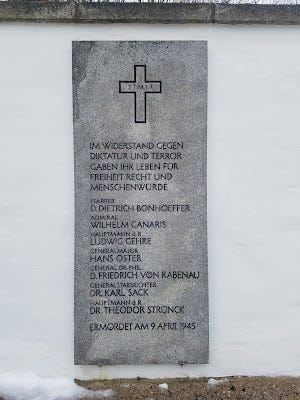
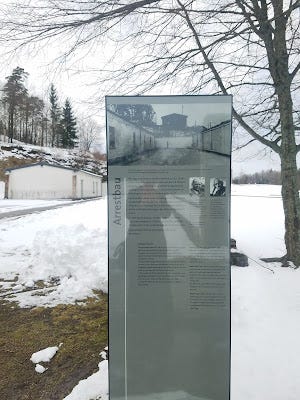
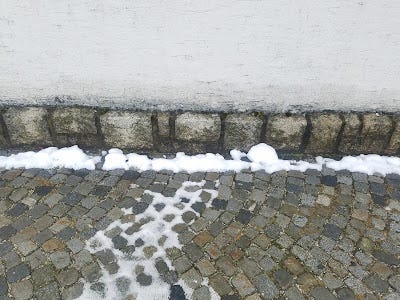

Somewhere down there Dietrich Bonhoeffer was executed. And now people come to stare, to see. Most leave thinking of the barbaric Germans. Few ponder the state of their own hearts, of the sort of person they would have been then, and the sort of person they are now.

I saw this tree and stared. I wondered who all had seen it, and how they had seen it. After being locked up for months, did Dietrich Bonhoeffer see it just before he died? How many Germans passed it, both kind-hearted and careless? How many tourists passed by it, unchanged, unphased?
The thing is, many of those that were imprisoned were changed more than those who remember WWII now. Many from Flussonburg became presidents, authors, artists. Though it was a granite camp and one would think that the prisoners would never wish to see granite again, a few became successful stonemasons after, even working predominately with granite.

But why do I saw all these things? Not because I wish to further spread the pain and memory of Germany's past. I wish that the entire world would forget that time. After the war, the villagers tore down most of the camp and built houses to live in. I love that and hate that. I love that they built good out of bad. I hate that they didn't seem to care enough about the bad, shamed only because it had hurt them, but not repentant because of the hurt others had suffered.
I do not wish for us to remember any of their pain, good or bad. I love history. But these days I'm starting to think some of us may focus on the past too much. We use other people's mistakes to lighten our own guilt. We say we learn history so that we might not repeat it. But we don't actually about the why, only what the victor tells us. It's very rare for us to get into the philosophy and theology of history, and to apply that knowledge to ourselves.
To ask ourselves, "What sort of person would I have been then? What sort of person am I now?"
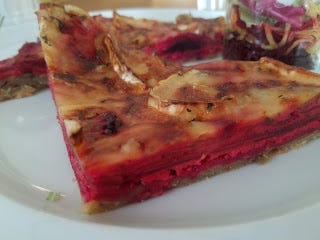
I write these things because I want a future. I want peace, not war. I want love, not hatred. I want a world where we each take responsibility for our own sins, where we own up and stop shifting accusations onto others.
I want a world of books, of dances, of happiness.
Where we pursue what we love more than we remember what others have done.
Where we can enjoy simple things, like beet soup, beet quiche (possibly my favorite thing I ate while in Germany), and poppyseed pie.
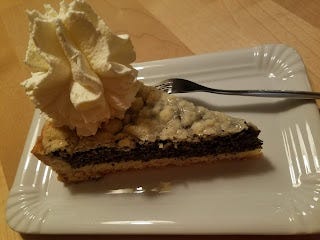
Why do you learn history? To be convicted, or to prolong condemnation?
Why do you remember the evil past of another nation?
Why do you remember the wrongs that others have committed?
Why do you remember your own wrongs?
""We learn history so that we don't repeat it." But this is a man's philosophy. Hitler knew why Napolean had lost his war in Russia. And yet Hitler stabbed himself in the very same way. History can be a beautiful past time. But it should never replace true wisdom and accountability.
History is not the only guide to our future.
There are men, who never having read a history book, lived the best sort of selfless, successful lives. I love history. Don't get me wrong. But it is not necessary if you simply choose what is right.
We do not need to know evil in order to be good.
It's time we forget those things of old, and take on a new man, and live. It's time we give Germany a break and let them flourish as a new nation. It's time we stretch ourselves and stop calling ourselves the "greatest nation" simply out of self-comparison. It's time we are great because of what we do, not because of what others have done.
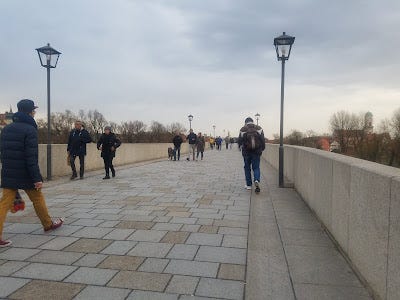
Old Stone Bridge over the Danube in Regensburg, Germany




